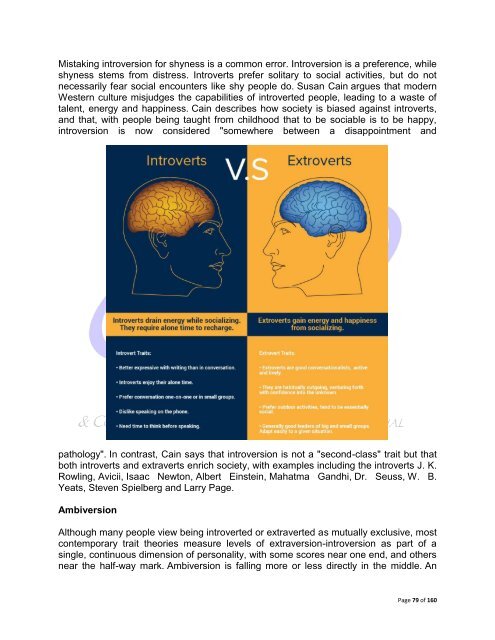The Gift of Introversion
The Gift of Introversion
The Gift of Introversion
Create successful ePaper yourself
Turn your PDF publications into a flip-book with our unique Google optimized e-Paper software.
Mistaking introversion for shyness is a common error. <strong>Introversion</strong> is a preference, while<br />
shyness stems from distress. Introverts prefer solitary to social activities, but do not<br />
necessarily fear social encounters like shy people do. Susan Cain argues that modern<br />
Western culture misjudges the capabilities <strong>of</strong> introverted people, leading to a waste <strong>of</strong><br />
talent, energy and happiness. Cain describes how society is biased against introverts,<br />
and that, with people being taught from childhood that to be sociable is to be happy,<br />
introversion is now considered "somewhere between a disappointment and<br />
pathology". In contrast, Cain says that introversion is not a "second-class" trait but that<br />
both introverts and extraverts enrich society, with examples including the introverts J. K.<br />
Rowling, Avicii, Isaac Newton, Albert Einstein, Mahatma Gandhi, Dr. Seuss, W. B.<br />
Yeats, Steven Spielberg and Larry Page.<br />
Ambiversion<br />
Although many people view being introverted or extraverted as mutually exclusive, most<br />
contemporary trait theories measure levels <strong>of</strong> extraversion-introversion as part <strong>of</strong> a<br />
single, continuous dimension <strong>of</strong> personality, with some scores near one end, and others<br />
near the half-way mark. Ambiversion is falling more or less directly in the middle. An<br />
Page 79 <strong>of</strong> 160

















